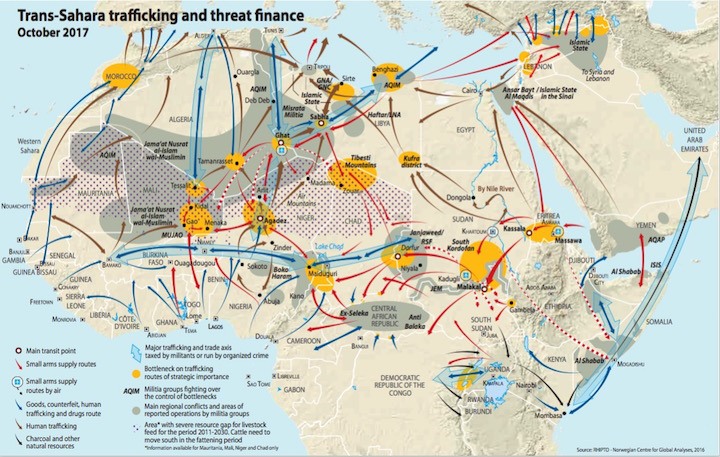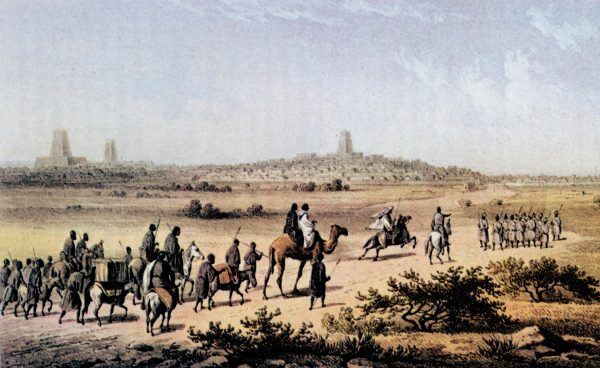The deaths of four American Special Forces soldiers in Niger dominated headlines in October. Fourteen UN peacekeepers were killed in Congo this morning, and four were killed in Mali last month. The increasing deaths of international forces in Africa are directly attributable to the increased drug smuggling in Africa.
Drug Smuggling in Africa: Major Routes
It is not a coincidence that there has been an associated rise in the activities of Islamist terrorist organizations. Boko Haram is a well-known jihadist group in Nigeria. Jama’at Nasr al-Islam wal Muslimin has gained some recent notoriety in Mali, but there are many more groups operating in African countries. All of them are inextricably linked with drug smuggling in Africa, and have branched out into human trafficking since 2014.

Most of the jihadi groups claim to be motivated by strict Wahhabi Salafist Islamic doctrine, which forbids the use of drugs. But the proceeds of the drug trade fund their terrorist activities. They are sometimes paid in weapons and ammunition rather than cash.
Heroin from the east, and cocaine from the west.
The trafficked drugs are heroin from the east, and cocaine from the west. There are two major sources of the drugs, and several subsidiary routes, but the destination for them all is the same: Europe. This is why they added human trafficking to their repertoire. The customers use the same routes, the same smugglers, and want to go to the same places.
The Southern Route
“The Southern Route” refers to heroin smuggled out of Afghanistan through Iran and sent across the Indian Ocean to East African coasts, especially Tanzania. It is smuggled in cargo ships and dhows, using centuries-old shipping routes. From there it is shipped either through central Africa to Chad, Niger and Mali, or to South Africa and then north along the western coast of Africa.
In either case, the major route from central Africa or South Africa goes through either Chad and Libya, or the eastern and northern parts of Mali, before heading north to Europe. The ancient smuggling routes through the Sahara desert have not changed in a thousand years. Once the drugs reach Mali’s northern city of Gao, there is a clear pathway north through Algeria and across the Mediterranean.
Highway 10 and “Air Cocaine”
“Highway 10” refers to the 10th parallel, which stretches across the Atlantic Ocean at ten degrees north latitude. Cocaine traveling along this “highway” originates in Colombia and Venezuela, and ends in the countries of the West African bulge. If it is smuggled by sea, it is offloaded at the coasts of Guinea-Bissau, Guinea, Sierra Leone, Liberia, Cote d’Ivoire, Ghana, Togo, Benin, and Nigeria.
If the cocaine is shipped by air, the flights usually terminate in – you guessed it – northern Mali. As early as 2009, authorities in Mali discovered the remnants of a Boeing 737 in the desert north of Gao. They believe it had been used to ship ten tons of cocaine from South America, and called this the “Air Cocaine” matter.

The effects this trafficking has had on Mali are devastating. The 2012 coup that put an end to ten years of stable, peaceful democratic rule had its start in the war on drugs. Mali’s military forces did not plot a coup, in the traditional sense; they were marching on the capital to protest the lack of government support for them in their battles against drug lords in the northern and eastern territories. The government fled the capital, and the army found itself in control. Mali is now fighting Islamist insurgents, its economy weakened and its tourism industry destroyed.
How to Defund the Terrorists
Terrorist attacks are now common and increasingly bold. The UK security forces just foiled an assassination attempt against Prime Minister Theresa May. French authorities just arrested members of a jihadi cell that were planning to attack a Christmas market; another French Christmas market was canceled for fear of an attack.
Drugs go north, and money goes south, both with evil consequences.
America and Europe could take action to end the rampant growth of terrorist activities in our countries. All this evil is being funded by rich people in North America and Europe who buy drugs. When wealthy societies decriminalized drug use, either de facto or de jure, they abdicated responsibility for a major part of enforcement. Producing countries have neither the means nor the power (nor, in many cases, the will) to stop drug production.
That leaves interdiction of trafficking as the only current means open to law enforcement to stop the vicious cycle: drugs go north, and money goes south, both with evil consequences. Unless the U.S. and Europe criminalize and enforce drug use again, and enforce the law – even against rich white people – this cycle of evil will engulf us all.
















